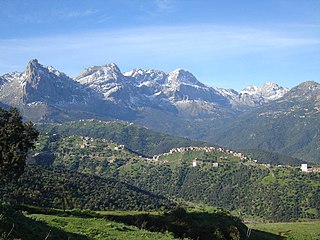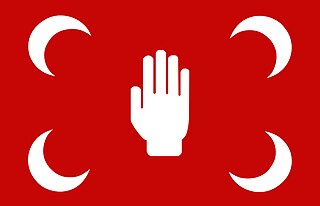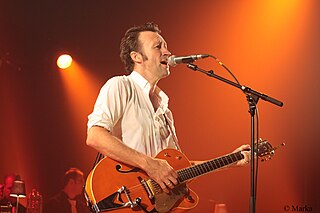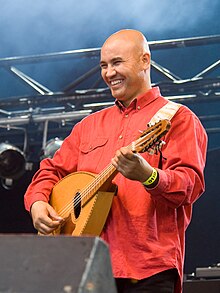
Berbers, or the Berber peoples, also called by their endonym Amazigh or Imazighen, are a diverse grouping of distinct ethnic groups indigenous to North Africa who predate the arrival of Arabs in the Maghreb. Their main connections are identified by their usage of Berber languages, most of them mutually unintelligible, which are part of the Afroasiatic language family.

Kabylia or Kabylie is a mountainous coastal region in northern Algeria and the homeland of the Kabyle people. It is part of the Tell Atlas mountain range and is located at the edge of the Mediterranean Sea.

Kabyle or Kabylian is a Berber language (tamazight) spoken by the Kabyle people in the north and northeast of Algeria. It is spoken primarily in Kabylia, east of the capital Algiers and in Algiers itself, but also by various groups near Blida, such as the Beni Salah and Beni Bou Yaqob.
Berber music refers to the musical traditions of the Berbers, a diverse grouping of distinct ethnic groups indigenous to North Africa who predate the arrival of Arabs in the Arab migration to the Maghreb. Their main connections are identified by their usage of the mostly mutually unintelligible Berber languages. Berber music varies widely across North Africa. It is stylistically diverse, with songs being predominantly African rhythms and a stock of oral literature.

Lounès Matoub was an Algerian Kabylian singer, poet, and thinker who sparked an intellectual revolution, and mandole player who was an advocate of the Berber cause, human rights, and secularism in Algeria throughout his life.

Souad Massi is an Algerian Berber singer, songwriter and guitarist. She began her career performing in the Kabyle political rock band Atakor, before leaving the country following a series of death threats. In 1999, Massi performed at the Femmes d'Algérie concert in Paris, which led to a recording contract with Island Records.

Hamid Cheriet, better known by his stage name Idir, was a Kabyle Algerian singer-songwriter and musician. Referred to as the "King of Amazigh music", he is regarded as one of the most significant modern day figures in Algerian and Amazigh culture, history, and struggle.

The Kabyle people are a Berber ethnic group indigenous to Kabylia in the north of Algeria, spread across the Atlas Mountains, 160 kilometres (100 mi) east of Algiers. They represent the largest Berber population of Algeria and the second largest in North Africa.

Marie-Louise-Taos Amrouche was an Algerian writer and singer. In 1947, she became the first Algerian woman to publish a novel.

Mouloud Mammeri was an Algerian writer, anthropologist and linguist.

New Moon is an album by the Algerian composer and singer-songwriter Abderrahmane Abdelli. It was released in 1995 by Real World Records. The album was produced in Brussels, with Abdelli recording his vocals before he was deported; the album was finished with local street musicians who played Algerian instruments.

Among Brothers is a World album released in 2003 by Algerian composer and singer-songwriter Abderrahmane Abdelli. The album was released by Real World Records.

The Movement for the Self-Determination of Kabylie, officially named the Movement for the Autonomy of Kabylie before 3 October 2013, is a Kabyle nationalist and separatist political organization seeking autonomy, self-determination rights of the Kabyle people, and ultimately independence of the Kabylie region from Algeria. It was founded by the Kabyle Berberist Ferhat Mehenni, now president of the Provisional Government of Kabylie in exile, after the "Black Spring" disturbances in 2001.

The culture of Algeria encompasses literature, music, religion, cuisine, and other facets of life in Algeria.

Igawawen or Gawawa, mostly known as Zwawa were a group of Kabyle tribes inhabiting the Djurdjura mountains, Greater Kabylia, in Algeria. The Zouaoua are a branch of the Kutama tribe of the Baranis Berbers.

The history of jazz in Belgium starts with the Dinant instrument maker Adolphe Sax, whose saxophone became part of military bands in New Orleans around 1900 and would develop into the jazz instrument par excellence. From then on the early history of jazz in Belgium virtually runs parallel to developments in the country of the birth of jazz, from the minstrel shows in the late 19th century until the first Belgian jazz album in 1927 and beyond.

Jeanfrançois Prins is a Belgian jazz guitarist, composer, vocalist and record producer. He has spent many years between New York City and Berlin where he was leading the Jazz Guitar departments in both music universities for a total of 12 years. Upon his return to Belgium in 2016, he became the CEO of the GAM Records label in 2017.

Serge Van Laeken, known as Marka, is a Belgian singer, songwriter, composer and film-maker.
Mohamed Seghir Boushaki, was an Algerian Kabyle politician after the French conquest of Algeria.

















